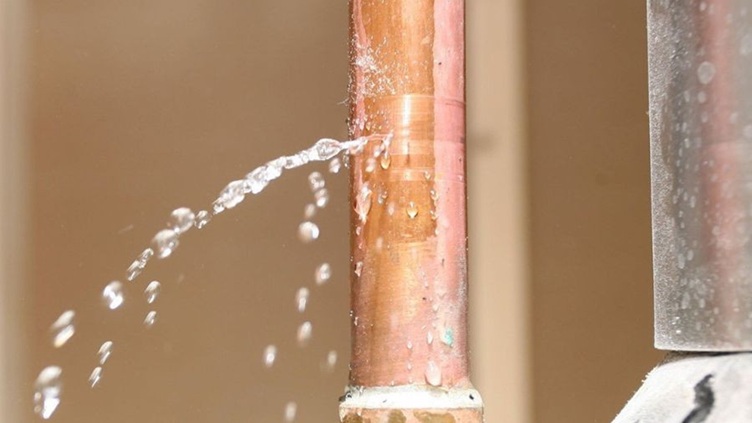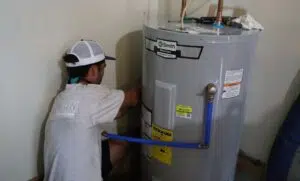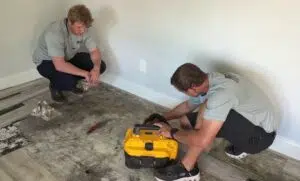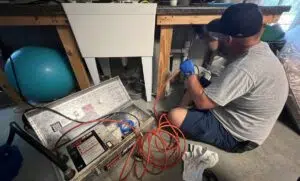Plumbing emergencies don’t follow a schedule. They show up during dinner, while you’re out of town, or at 2 a.m. on a holiday weekend. But knowing how to respond in the first few minutes can make a big difference — not just in limiting damage, but also in saving money and stress.
Here’s what every homeowner (and renter) should know about shutting off water when something goes wrong.
Step One: Isolate the Leak If You Can
Before turning off water to the entire house, take a moment to identify where the problem is coming from. If it’s a small, localized leak — like a dripping faucet, a leaking toilet, or a faulty hose bib — you might be able to stop it right at the fixture.
Most sinks, toilets, and outdoor spigots have their own shut-off valves. These are typically found:
- Under sinks (inside the cabinet),
- Behind toilets (near the wall),
- Next to washing machines and behind appliances.
Turning these small valves clockwise will shut off water to just that one fixture, so the rest of the home can continue running as usual.
Test These Yearly:
Over time, these valves can seize up or become difficult to turn. Take a few minutes at least once a year to turn each one off and back on again. That simple step can help ensure they’ll work when you need them most.
Hot Water Leak? Check the Shut-Off on the Water Heater
If you discover a leak that only involves hot water — for example, a pipe carrying hot water is dripping, or water is coming from the top of your water heater — you may not need to shut off water to the whole house.
Look for the cold water shut-off valve located at the top of your water heater (usually the pipe entering the tank on the right side). Turning this valve off will stop the flow of water into the heater and prevent more hot water from leaking out.
This valve should be tested from time to time, just like fixture valves. If it doesn’t turn easily, it might not be usable in an emergency.
When It’s Bigger: Know Where the Main Shut-Off Is
If the leak is large, spreading fast, or you can’t identify the source, you’ll need to turn off all water to the house. Every home has a main shut-off valve. In the Charleston area, this is usually:
- Outside by the street near your water meter,
- In a crawl space or basement (if your home has one),
- Or in a garage or utility closet.
- Or in the ground usually near the hose bib
Turn this valve clockwise to stop the water. It may take some force, especially if it hasn’t been moved in a while.
Make sure everyone in your household knows where this valve is and how to use it. Emergencies can happen when you’re not home — and the faster someone can respond, the better the outcome.
Add a Layer of Protection: Water Alarms
One simple and inexpensive way to catch leaks early is to use water alarms. These small battery-powered devices are available at most local hardware stores and are easy to use — just place them where leaks are most likely to happen.
Common spots include:
- Under sinks,
- Behind toilets,
- In cabinets near plumbing,
- Around washing machines and dishwashers,
- Near or under your water heater.
If water touches the sensor, the alarm sounds loudly — alerting you to even a small leak before it becomes a much bigger problem. For just a few dollars, these little devices can buy you valuable time and peace of mind.
Bonus Tip: Pick Up a Curb Key While You’re There
While you’re at the hardware store grabbing water alarms, consider picking up a curb key too. These long-handled tools are used to shut off the water at the street — right at the meter.
If you have a major leak in your yard, or if your home’s main shut-off valve fails, a curb key can give you one last line of defense. They’re inexpensive, easy to store, and could make all the difference in a true emergency.
A Little Knowledge Can Save You a Lot
The ability to isolate smaller leaks — especially outside normal business hours — can help you avoid costly emergency or after-hours plumbing calls. If you can stop the leak and wait until morning, you’ll likely save money and avoid stress.
Take Five Minutes This Week
Take a short walk through your home this week and:
- Locate your main water shut-off,
- Check the shut-offs on your fixtures and water heater,
- Make sure they all turn properly,
- Show everyone in your home what to do in an emergency,
- Place a few water alarms in key areas,
- And consider keeping a curb key on hand for added peace of mind.
A little preparation now can prevent a big headache later.









